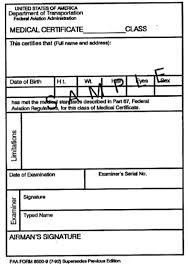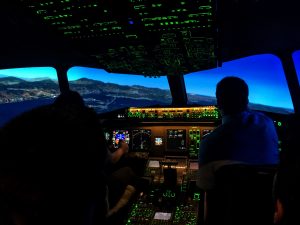In response to the havoc created by the COVID-19 pandemic, the FAA took action to provide relief to the aviation industry. The FAA did this by both granting exemptions and by temporarily revising its enforcement policy. In both instances, it is providing relief to airmen and air carriers who may be prevented from completing certain training or qualification deadlines, as well as airmen renewing their airman medical certificates.
Airmen Medical Certificates
The FAA issued an Enforcement Policy For Expired Airman Medical Certificates to provide relief to airmen who may be unable to obtain an examinations from their aviation medical examiners to renew their FAA airmen medical certificates. The policy states that the FAA will not take enforcement action against an airman who operates an aircraft with an expired medical certificate from March 31, 2020 through June 30, 2020.
 It is important to understand that this policy does not change the regulations requiring an airman to have a medical certificate for certain aircraft operations. Rather, the policy simply means the FAA will exercise its prosecutorial discretion and NOT pursue enforcement action against an airman who operates an aircraft during that time with an expired medical certificate.
It is important to understand that this policy does not change the regulations requiring an airman to have a medical certificate for certain aircraft operations. Rather, the policy simply means the FAA will exercise its prosecutorial discretion and NOT pursue enforcement action against an airman who operates an aircraft during that time with an expired medical certificate.
However, this policy only applies to medical certificates that actually expire between March 31, 2020 and June 30, 2020. If an airman operates an aircraft during that time period with a medical certificate that expired BEFORE March 31, 2020, could still be subject to FAA enforcement action.
Additionally, the FAA reminds airmen that they are still subject to 14 C.F.R. § 61.53 (prohibiting operation of an aircraft when an airman has a disqualifying condition or is taking medicine/receiving treatment that would disqualify the airman from obtaining a medical certificate). The FAA will still take enforcement action against an airman for violating § 61.53 even if it would not take action based upon an expired medical certificate.
Air Carrier Exemptions
In response to several requests from the National Air Transportation Association, the FAA has issued several exemptions providing relief to air carriers, including 14 C.F.R. Part 135 air carriers, and their flight crewmembers. Unlike the medical certificate policy statement, in this instance, the FAA is waiving the requirement to comply with certain regulations.
This exemption exempts operators from the requirement that flight crewmembers put on protective breathing equipment/oxygen masks during their recurrent and upgrade training, testing and checking. However, operators must still provide alternate methods to complete this training. The exemption expires on May 31, 2020.
To take advantage of this exemption, operators will need to provide certain information to their principal operations inspectors. Additionally, flight crewmembers will need to complete the required training during their next subsequent recurrent/upgrade training or within 12 months (plus a 1 month grace period) of training with the alternate method, whichever occurs earlier.
This exemption applies to recurrent training and qualification activities of Part 135 ground personnel and flight crewmembers that were due to completed through May 31, 2020. The exemption allows completion of certain recurrent training and qualification activities as follows:
- up to two calendar months after the month that the training/qualification was due to have been completed under 14 C.F.R. §§ 135.245(c) and 135.247(a); and
- up to three calendar months after the month that the training/qualification was due to have been completed under 14 C.F.R. §§ 135.293(a) and (b) 135.295, 135.297(a) and (b), 135.299(a), 135.337(f), 135.338(f), 135.339(a)(2), 135.340(a)(2), 135.343, and 135.505(a).
As with Exemption FAA-2020-0291, operators will need to provide certain information to their principal operations inspectors to take advantage of the exemption. Also, operators must use methods that will ensure personnel and flight crewmembers remain adequately trained and proficient during the grace period.
Conclusion
It is nice to see the FAA responding to industry requests in this time of crisis. And this action shows it is possible to provide a little accommodation and understanding with respect to these real-world issues not jeopardize aviation safety.
It is also my understanding that the FAA will continue to monitor the situation and may consider further relief if necessary. I look forward the FAA’s consideration and help as we all deal with the impact of the COVID-19 pandemic.


